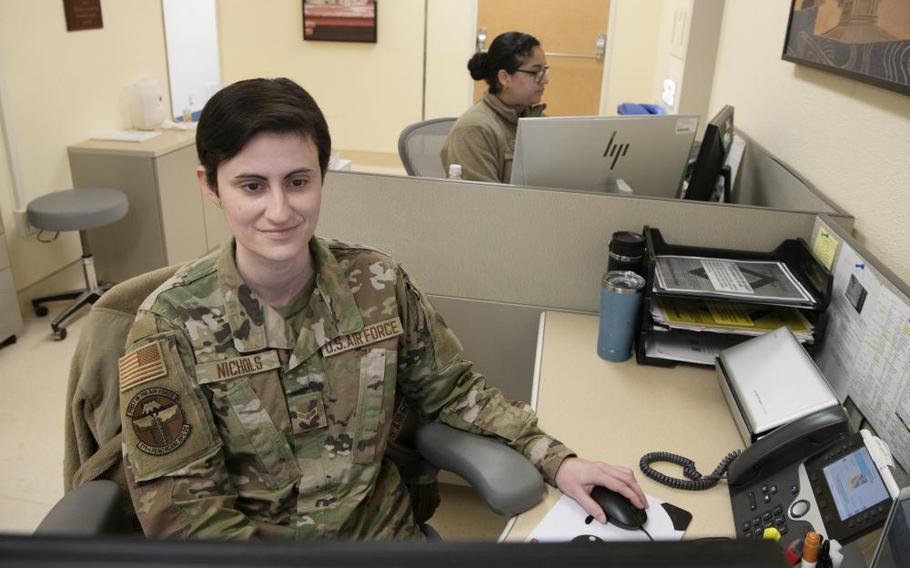Spotlight!
Yokota internal medicine team paves paths to specialty care
374th Airlift Wing Public Affairs March 17, 2023

U.S. Air Force photo by Tech. Sgt. Christopher Hubenthal ()
YOKOTA AIR BASE, Japan -- A team within the 374th Health Care Operations Squadron's internal medicine clinic works to facilitate escalated medical care when a patient’s needs exceed the scope of their primary care manager.
The internal medicine clinic has a five-person team that is responsible for issuing referrals to patients so they can receive off-installation specialty care as necessary, but also provides supplemental care by providing support for ongoing care relating to blood borne pathogens, human immunodeficiency virus (HIV), and cardiology.
“Our goal is to take care of people by getting them to the best care possible,” said Maj. Matthew Bezzant, 374th HCOS internal medicine physician. “We take on patients when primary care or family health doctors have a patient that needs a specialized procedure or treatment, and we refer them to the best provider for that service. Sometimes it’s here in our clinic, off base or even in the United States, but our priority is always to get them to the right place, at the right time, for the right thing.”
The team functions as liaisons with Japanese medical facilities and U.S. hospitals to ensure a patient receives treatment when referred off-base and gives them opportunities to work alongside their Japanese counterparts to not only exchange best practices, but also help bridge the gap between American and Japanese medical care in Japan.
“We have a program here where we integrate and train alongside several Japanese fellows,” said Airman 1st Class Jasmine Wilkerson, 374th HCOS internal medicine clinic medical technician. “Depending on the week or training they’re doing, sometimes they will shadow us. I’ll put in information, but they will be asking the questions, getting the history, and getting more comfortable with speaking to the patients.”
The integration allows both sides to exchange best practices, helps prepare Japanese physicians to work with English speaking patients, and supports getting U.S. patients the medical care they need at Japanese facilities.
“The local doctors in Japan we work with are an invaluable asset for us,” said Bezzant. “The Japanese health care system is fundamentally different from the U.S. in both the overall operation and the rules they follow. The fellows we work alongside know how both sides function, so if there’s an emergency, we call in the fellows to help find a receiving hospital, brief the doctors, and make sure care goes smoothly. They are wonderful to have, and we really appreciate them.”
The internal medicine team mission aims to connect patients to care they need to thrive and does so with a profound dedication.
“Techs and nurses can anticipate what the doctors need 95% of the time,” said Wilkerson. “Our experience helps us take care of everything we can within our scope, and that enables the doctors focus on the patient’s medical needs. If I can come in a little bit early or stay a little bit late to save time for the doctor to do more … I’m going to do it.”
The team attributed their success to their sustained commitment to quality care, which is evidenced by late hours and extra effort. Whether helping resolve a medical issue at the clinic or referring a patient to a medical facility in Japan or the U.S., the internal medicine team is dedicated to their patients’ welfare.
“Our team is very dedicated to making sure we take care of our patients first,” Bezzant added. “We have a tendency to stay late and work long to make sure that happens and I’m very proud of the team for doing that.”
Photo Caption: Airman 1st Class Melissa Nichols (front), 374th Health Care Operations Squadron medical administrative technician, and Staff Sgt. Monica Jaime, 374th HCOS medical administration NCOIC, checks in patients and schedules appointments at the Internal Medicine Clinic located at Yokota Air Base, Japan, Jan. 25, 2023. The clinic consists of a five-person team who supplements specialty care services by providing basic support to medical issues including blood borne pathogens, human immunodeficiency virus (H.I.V.), and cardiology. If the clinic can’t meet a patient’s needs, the team works as a liaison with Japanese medical facilities and U.S. hospitals to ensure a patient receives needed treatment.